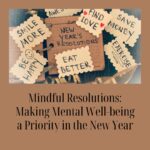As we step into the New Year, the tradition of setting resolutions and goals takes center stage for many people. While some of us may focus on tangible achievements like fitness or career milestones, it’s crucial not to overlook the cornerstone of overall well-being: mental health. Prioritizing mental well-being can significantly impact our lives, fostering resilience, happiness, and a more fulfilling journey. So let’s explore the importance of making mental health a priority and provide actionable examples to help you weave it into your daily life.
Understanding the Importance of Mental Well-being
Before diving into practical tips, it’s essential to recognize why mental health should be at the forefront of your goals. Our mental well-being influences every aspect of our lives, from relationships to work performance. By prioritizing mental health, you’re investing in your ability to handle stress, navigate challenges, and enjoy a more positive outlook on life.
Set Realistic Expectations
One of the keys to maintaining good mental health is setting realistic expectations for yourself. Instead of overwhelming yourself with an extensive list of goals, focus on a few achievable and meaningful objectives. This might involve breaking down larger goals into smaller, manageable steps. For instance, if your goal is to reduce stress, consider incorporating mindfulness practices into your routine for just a few minutes each day.
Incorporate Mindfulness Practices
Mindfulness is a powerful tool for improving mental well-being. Whether through meditation, deep breathing exercises, or mindful walks, taking moments to be present can reduce stress and increase overall happiness. Begin with short sessions and gradually extend the duration as you become more comfortable. Apps and online resources can guide you through mindfulness practices, making it accessible for beginners.
Establish Healthy Boundaries
Creating and maintaining healthy boundaries is vital for protecting your mental well-being. This might involve setting limits on work hours, learning to say no when necessary, and prioritizing self-care. Healthy boundaries contribute to a balanced and fulfilling life, reducing the risk of burnout and enhancing overall mental resilience.
Prioritize Self-Care Rituals
Self-care is not a luxury; it’s a necessity for maintaining mental health. Identify activities that bring you joy and relaxation, whether it’s reading, taking a bath, or spending time in nature. Self-care also includes your internal dialogue. Be sure that you are being kind and compassionate toward yourself. And schedule regular self-care rituals into your routine to ensure they become non-negotiable parts of your day or week.
Connect with Others
Human connections play a significant role in mental well-being. Make it a goal to nurture your relationships, whether with family, friends, or a supportive community. Plan regular social activities, even if they’re virtual, and prioritize quality time with loved ones. Building a strong support system contributes to a sense of belonging and emotional resilience.
Seek Professional Support
If you find that your mental health goals require additional support, don’t hesitate to seek help from a mental health professional. Therapists, counselors, and psychologists can provide valuable insights, coping strategies, and a safe space to explore and address any challenges you may be facing.
Remember
As you embark on your journey into the New Year, note that mental well-being is not a destination but a continuous, evolving process. By prioritizing your mental health, you’re investing in a healthier, more fulfilling life. Set realistic expectations, incorporate mindfulness practices, establish healthy boundaries, prioritize self-care, connect with others, and seek professional support when needed. Embrace the journey toward mental well-being, and let it be the foundation for achieving all your other aspirations in the coming year.










